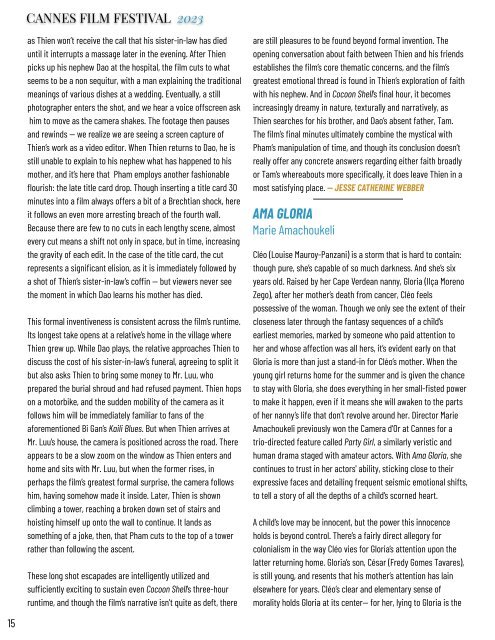Create successful ePaper yourself
Turn your PDF publications into a flip-book with our unique Google optimized e-Paper software.
CANNES FILM FESTIVAL 2023<br />
as Thien won’t receive the call that his sister-in-law has died<br />
until it interrupts a massage later in the evening. After Thien<br />
picks up his nephew Dao at the hospital, the film cuts to what<br />
seems to be a non sequitur, with a man explaining the traditional<br />
meanings of various dishes at a wedding. Eventually, a still<br />
photographer enters the shot, and we hear a voice offscreen ask<br />
him to move as the camera shakes. The footage then pauses<br />
and rewinds <strong>—</strong> we realize we are seeing a screen capture of<br />
Thien’s work as a video editor. When Thien returns to Dao, he is<br />
still unable to explain to his nephew what has happened to his<br />
mother, and it’s here that Pham employs another fashionable<br />
flourish: the late title card drop. Though inserting a title card 30<br />
minutes into a film always offers a bit of a Brechtian shock, here<br />
it follows an even more arresting breach of the fourth wall.<br />
Because there are few to no cuts in each lengthy scene, almost<br />
every cut means a shift not only in space, but in time, increasing<br />
the gravity of each edit. In the case of the title card, the cut<br />
represents a significant elision, as it is immediately followed by<br />
a shot of Thien’s sister-in-law’s coffin <strong>—</strong> but viewers never see<br />
the moment in which Dao learns his mother has died.<br />
This formal inventiveness is consistent across the film’s runtime.<br />
Its longest take opens at a relative’s home in the village where<br />
Thien grew up. While Dao plays, the relative approaches Thien to<br />
discuss the cost of his sister-in-law’s funeral, agreeing to split it<br />
but also asks Thien to bring some money to Mr. Luu, who<br />
prepared the burial shroud and had refused payment. Thien hops<br />
on a motorbike, and the sudden mobility of the camera as it<br />
follows him will be immediately familiar to fans of the<br />
aforementioned Bi Gan’s Kaili Blues. But when Thien arrives at<br />
Mr. Luu’s house, the camera is positioned across the road. There<br />
appears to be a slow zoom on the window as Thien enters and<br />
home and sits with Mr. Luu, but when the former rises, in<br />
perhaps the film’s greatest formal surprise, the camera follows<br />
him, having somehow made it inside. Later, Thien is shown<br />
climbing a tower, reaching a broken down set of stairs and<br />
hoisting himself up onto the wall to continue. It lands as<br />
something of a joke, then, that Pham cuts to the top of a tower<br />
rather than following the ascent.<br />
These long shot escapades are intelligently utilized and<br />
sufficiently exciting to sustain even Cocoon Shell’s three-hour<br />
runtime, and though the film’s narrative isn’t quite as deft, there<br />
are still pleasures to be found beyond formal invention. The<br />
opening conversation about faith between Thien and his friends<br />
establishes the film’s core thematic concerns, and the film’s<br />
greatest emotional thread is found in Thien’s exploration of faith<br />
with his nephew. And in Cocoon Shell’s final hour, it becomes<br />
increasingly dreamy in nature, texturally and narratively, as<br />
Thien searches for his brother, and Dao’s absent father, Tam.<br />
The film’s final minutes ultimately combine the mystical with<br />
Pham’s manipulation of time, and though its conclusion doesn’t<br />
really offer any concrete answers regarding either faith broadly<br />
or Tam’s whereabouts more specifically, it does leave Thien in a<br />
most satisfying place. <strong>—</strong> JESSE CATHERINE WEBBER<br />
AMA GLORIA<br />
Marie Amachoukeli<br />
Cléo (Louise Mauroy-Panzani) is a storm that is hard to contain:<br />
though pure, she’s capable of so much darkness. And she’s six<br />
years old. Raised by her Cape Verdean nanny, Gloria (Ilça Moreno<br />
Zego), after her mother’s death from cancer, Cléo feels<br />
possessive of the woman. Though we only see the extent of their<br />
closeness later through the fantasy sequences of a child’s<br />
earliest memories, marked by someone who paid attention to<br />
her and whose affection was all hers, it’s evident early on that<br />
Gloria is more than just a stand-in for Cléo’s mother. When the<br />
young girl returns home for the summer and is given the chance<br />
to stay with Gloria, she does everything in her small-fisted power<br />
to make it happen, even if it means she will awaken to the parts<br />
of her nanny’s life that don’t revolve around her. Director Marie<br />
Amachoukeli previously won the Camera d’Or at Cannes for a<br />
trio-directed feature called Party Girl, a similarly veristic and<br />
human drama staged with amateur actors. With Ama Gloria, she<br />
continues to trust in her actors' ability, sticking close to their<br />
expressive faces and detailing frequent seismic emotional shifts,<br />
to tell a story of all the depths of a child’s scorned heart.<br />
A child’s love may be innocent, but the power this innocence<br />
holds is beyond control. There’s a fairly direct allegory for<br />
colonialism in the way Cléo vies for Gloria’s attention upon the<br />
latter returning home. Gloria’s son, César (Fredy Gomes Tavares),<br />
is still young, and resents that his mother’s attention has lain<br />
elsewhere for years. Cléo’s clear and elementary sense of<br />
morality holds Gloria at its center<strong>—</strong> for her, lying to Gloria is the<br />
15
















